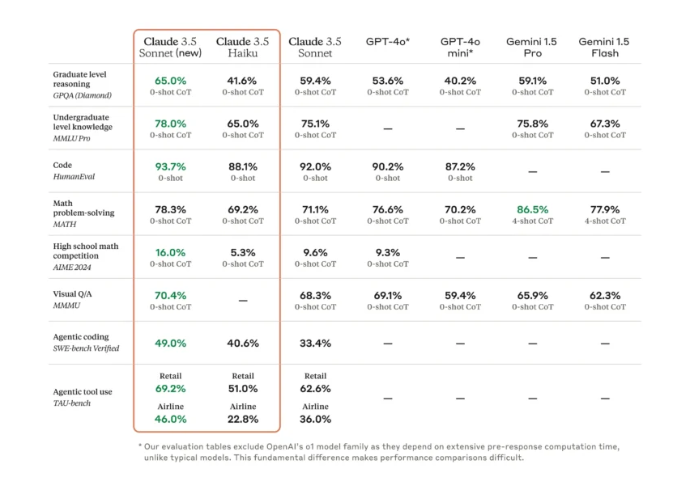Anthropic recently released major updates to the Claude AI model series, including an upgraded version of the Claude3.5 Sonnet and the new Claude3.5 Haiku. This update not only achieved significant improvements in model performance, but also showed extremely strong competitiveness in cost efficiency, marking a new milestone in the development of the artificial intelligence industry. In particular, the advancements in programming capabilities and logical reasoning are even more eye-catching and provide new possibilities for the widespread application of AI technology.
Anthropic recently released major updates to its Claude AI model series, including an upgraded version of Claude3.5Sonnet and the all-new Claude3.5Haiku.
This update not only made significant progress in performance, but also showed greater competitiveness in cost efficiency. This release is seen as an important milestone in the AI industry, especially in improving programming capabilities and logical reasoning.

The new version of the model performs excellently in multiple performance benchmarks, especially the Claude3.5Haiku model has achieved outstanding results in programming tasks. The upgraded Claude3.5Sonnet model scored 49.0% in the software engineering benchmark verification test, setting a new record for publicly available models, including some professional programming systems. It is worth noting that the new Haiku model is comparable to Claude3Opus in performance, but the operating costs are significantly reduced, with only $1 per million input tokens and $5 for output tokens, which allows the organization to More flexible and efficient when implementing AI.
In addition to a significant improvement in programming capabilities, the performance of the Claude model in language comprehension and logical reasoning has also improved. For example, in the TAU benchmark that evaluates tool usage capabilities, the Sonnet model scored from 62.6% to 69.2%. These improvements suggest that the AI field is undergoing a new development model where high performance capabilities are no longer linked to high costs, which helps promote the popularity of AI technology.
Anthropic's strategy is not limited to developing tools for specific tasks, but focuses on a wider range of applications, giving Claude certain general-purpose computer skills. By launching a new API, Claude can directly operate the standard software interface used by human users, implementing functions such as mouse movement, element selection, and text input. This advancement in human-computer collaboration has laid the foundation for future AI applications.
In addition, this release will have a profound impact on the business of various industries. Enterprises can now obtain stronger AI capabilities at a lower cost, facilitating AI adoption in all walks of life. Especially in the field of software development, the upgraded programming capabilities will greatly improve the team's work efficiency. Enhanced language understanding will also bring new opportunities for customer service and content generation. With the popularity of these new features, it is expected that the application of enterprise AI will accelerate.
Key points:
Anthropic's Claude3.5Sonnet and Haiku models have made significant progress in performance and cost efficiency.
The new API enables Claude to interact directly with the computer interface and improves human-computer collaboration capabilities.
The update will accelerate the adoption of AI technology in various industries and help companies achieve efficient AI applications at a lower cost.
The update of the Claude 3.5 series model indicates that AI technology will develop in a more efficient, economical and easier to apply. This will not only change the enterprise operation model, but also bring more possibilities to the future development of artificial intelligence, which is worthy of continuous attention.